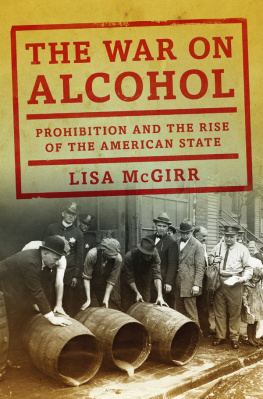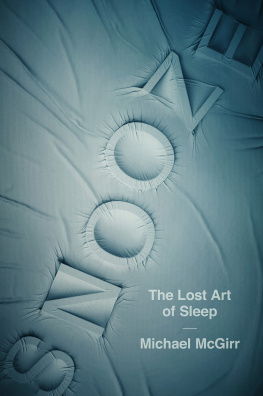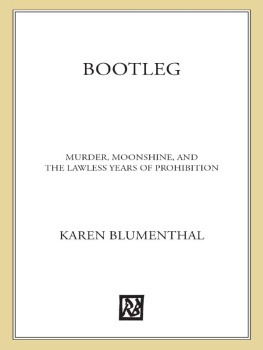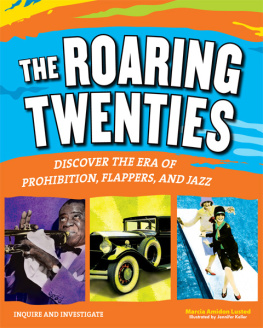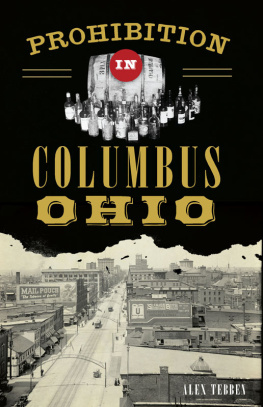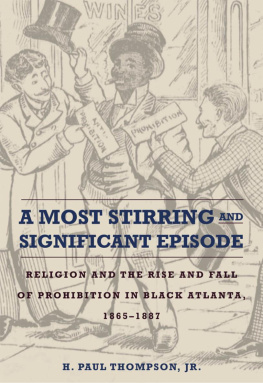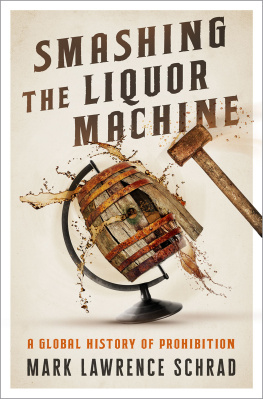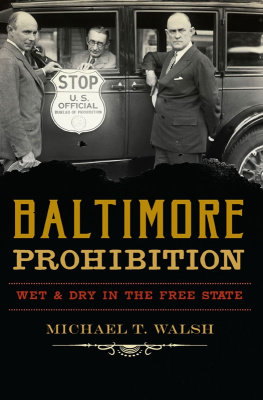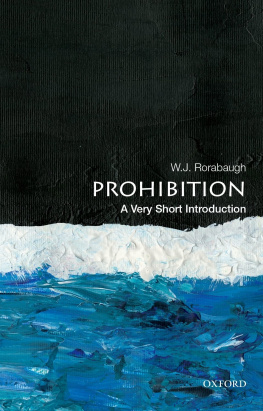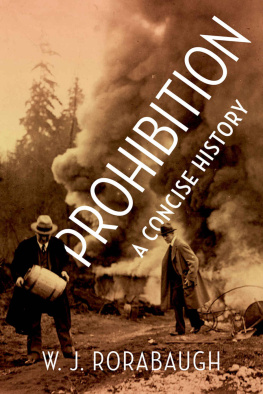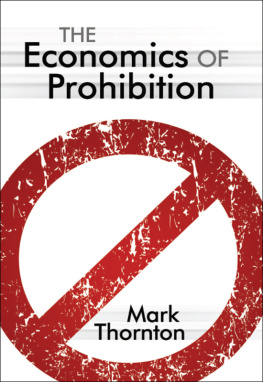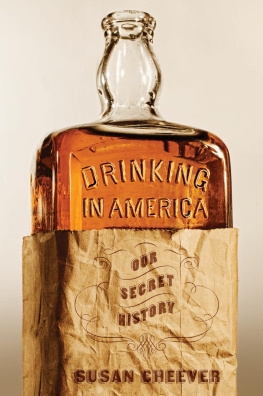
ALSO BY LISA MCGIRR
Suburban Warriors:
The Origins of the New American Right

The War on Alcohol: Prohibition and the Rise of the American State
Copyright 2016 by Lisa McGirr
All rights reserved
First Edition
For information about permission to reproduce selections from this book,
write to Permissions, W. W. Norton & Company, Inc.,
500 Fifth Avenue, New York, NY 10110
For information about special discounts for bulk purchases, please contact W. W. Norton Special Sales at specialsales@wwnorton.com or 800-233-4830
Book design by JAM Design
Production manager: Devon Zahn
ISBN 978-0-393-06695-1
ISBN 978-0-393-24879-1 (e-book)
W. W. Norton & Company, Inc.
500 Fifth Avenue, New York, N.Y. 10110
www.wwnorton.com
W. W. Norton & Company Ltd.
Castle House, 75/76 Wells Street, London W1T 3QT
FOR SVEN
Following page 106:
WHEN FRANKLIN D. ROOSEVELT TOOK OFFICE ON MARCH 4, 1933, with the global economy on the brink of collapse, he called Congress into special session. The new president inaugurated the New Deals activist one hundred days by urging quick passage of the Emergency Banking Act to rescue the financial system and the Economy Act to cut salaries of government employees and veterans benefits. On his eighth day in office, Roosevelt forwarded his third major policy initiative, after proclaiming to a small group of advisors, Its time the country did something about beer. That very night he drafted his plea to Congress for its legalization, declaring action at this time to be of the highest importance.
When the clerk read Roosevelts statement on the floor of Congress, cheers rang out. Less than thirty hours later, the beer bill sailed through the House. The commodity banned for close to fourteen years was relegalized on April 6. At the nadir of the nations economic catastrophe, beer took its place in the vanguard of New Deal measures. That night a festooned truck escorted by a police detail pulled up to the
Around the country, the celebratory mood that welcomed the end of the war on alcohol was chastened by the daunting task of recovery and the massive crisis of unemployment. In the following two years, Roosevelt and Congress unleashed the largest burst of policy innovation the federal government has ever seen. The once preoccupying war on alcohol came to appear as but a footnote to the main drama of the New Deal and the regulatory state it spawned. Roosevelts popular beer bill is ignored in most historical accounts of the New Deals opening days. So too are the contributions of the war on alcohol to the development of the American state and to politics in twentieth-century America.
On one level, this is not surprising. The Eighteenth Amendment was, after all, one of the nations most significant policy debacles: after less than fifteen years it became the first, and it remains the only, constitutional amendment to be rescinded. The admission by one former antiliquor crusader that Prohibition was stupidly wrong and had led to an utter disregard for law epitomized a widely accepted verdict by the time of repeal. Such a devastating pratfall, however, distracted contemporaries and later chroniclers from the significant but largely unacknowledged mark left on Americas still-developing state by this social experiment. This book restores national Prohibition to its critical role in the building of the modern American state.
For the most part, Great Depression contemporaries let Prohibition simply drop from public consciousness. A few, however, did plumb its failure for deeper lessons. In 1934, the radical artist Ben Shahn, while employed by the Public Works of Art Project, an early New Deal initiative,
The generation of historians writing soon after the New Deal and World War II did not entirely ignore Prohibition but they overwhelmingly emphasized its failings. The majority shared liberal New Deal reform sensibilities, and they drew a sharp separation between the New Deal and the war on alcohol that preceded it. They found the origins of the New Deal coalition not in debates between wets and drys but in the material dislocations of the Great Depression. They linked New Deal policy makers to earlier economic regulatory efforts from the income tax to the Federal Trade Commission, not to the institutional rigors of running a massive expansion of the federal enforcement establishment. The influential historian Richard Hofstadter wrotein a postWorld War II dismissal that became gospelthat the Eighteenth Amendment was a farce, a vestigial remnant of the World War I reform debauch and its crusading village cast of mind. He relegated it to a symbol of the moral overstrain of the preceding era, the butt of jokes, a perennial source of irritation, a memento of the strange power of crusades of absolute morality to intensify the evils they hope to destroy. Such preposterous restrictions were, Hofstadter implied, completely ineffectual. Historians writing after Hofstadter mostly followed
A later generation of historians broke with Hofstadters dismissal of the Progressive reform impulse behind the Eighteenth Amendment, but they continued to marginalize it in other ways. Convinced that the amendment was essentially dead on arrival, most scholars have focused on the struggle to pass such an impractical project, neglecting as predetermined its flawed implementation and eventual failure. Some scholars even interpreted Prohibition as a symbolic crusade whose real aim was to affirm the cultural dominance of Yankee Protestantism. Even those few historians who focused on the Prohibition years devoted most of their attention to the repeal effort among influential elites or the farcical attempts to enforce Prohibition in wet jurisdictions.
Filling the vacuum, there developed an entire genre of sensationalist books and movies set in the Prohibition years. They featured a colorful cast of bootleggers and gangsters, from Chicagos Al Capone to Ohios George Remus. In these narratives, bootleg liquor flows freely, cultural rebellion flowers in the back rooms of speakeasies, and criminal entrepreneurs make and lose fabulous fortunes and sometimes their lives. These fragmentary portraits of the Prohibition years have had an outsized impact on both popular and scholarly understandings of the roaring twenties, or the Jazz Age. Taken together, they have obscured one of Americas greatest experiments in state building and its lasting institutional and ideological effects. The selective focus of these chronicles on elite groups and the national level, moreover, buries the highly differential impact of the law on distinct social groups, many of whom face parallel challenges to this day.
THIS book tells a more consequential storyone closely attuned to the ways in which social class, ethnicity, race, gender, and religiosity powerfully shaped not just the passage of the Eighteenth Amendment but also its more than decade-long unfolding across the nation. The War on Alcohol charts the battles waged over Prohibition between different social groups from its unfolding to its demise. The seemingly uniform impact of the national law actually took on a very different cast in distinct settings, from metropoles like Chicago and New York to small towns and cities such as Herrin, Illinois, and Richmond, Virginia. In these varied settings the Prohibition drama features a new cast of characterspolicy entrepreneurs and religious reformers, local and state enforcement agents, immigrant workers, ethnic politicians, and struggling rural whites and African-Americans. Through these ordinary Americans we see the effects of Prohibition on everyday experience. This approach also recasts our understanding of broader historical developments, including the political awakening of the religious right, the electoral realignment that launched the New Deal, and the emergence of the twentieth-century federal penal state. As the story unfolds, it will become clear that the war on alcohol was no mere distraction with few lasting consequences: Prohibition remade national party politics and imprinted the path of American state development into distinctive and permanent molds.
Next page
